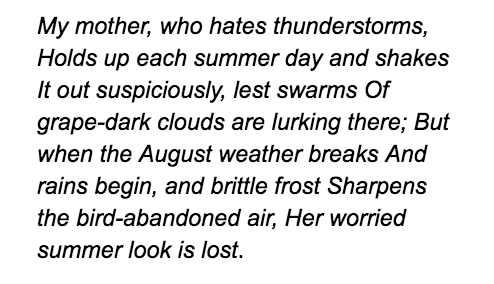From the Desk of the President: A Review of Phillip Larkin’s “Collected Poems”
Looking for Meaning? Try Poetry
By John Garvey
When I was young we memorized all sorts of things in school, including some poetry I can still recite. “Rote memorization” then became a bête noire in schools of education, and the practice fell out of favor. That’s a shame, if you ask me.
Among literary forms, poetry seems most underappreciated. Perhaps that’s because people don’t memorize poems any more. Or maybe it’s because, unlike plays, novels, and short stories, poems don’t usually have a plot, a beginning, middle, and end, that makes it easy to follow the author’s meaning. Poems can be obscure and require some work to decode.
Robert Wilken recently gave a talk here, in which he recited a poem by Philip Larkin. I liked it so much that I bought Larkin’s Collected Poems. Larkin, who died in 1985, was one of post-war England’s best poets. His Collected Poems include most of what he wrote, including a number of pieces unpublished in his lifetime, and many from notebooks he filled as a young man.
Sometimes an artist’s stock goes up after he dies. This might be the case for Larkin, and it explains in part this posthumous publication of his work. In the volume’s introduction Larkin’s friend Anthony Thwaite, also a poet, observes that not all the poems are of comparable quality. Some show a less mature Larkin; others are more polished and artful. Thwaite also comments on how in some cases Larkin spent years working and reworking lines. That in itself is something to marvel at. Imagine a painter spending years dabbing at a 6-by-6-inch canvas.
Larkin’s work is at once traditional and modern. He is fond of using imagery from nature, and his lines skillfully evoke a range of emotions.
His poems are introspective and develop themes typical for the mid-twentieth century: mortality and grief, self-doubt, sadness at the unstoppable passage of time. His take on the world tends toward the mournful, but there is something uplifting in his message. He is sensitive, observant, and convinced that doing poetry — taking in the world and trying to get it down on paper in an authentic and artistic way — is worthwhile. Doing poetry in this way is an act of defiance – planting the flag of meaning in a culture more and more overtaken by a cloud of meaninglessness.
Take, for example, the first stanza of a poem called “Mother, Summer, I”:

The second stanza then offers the speaker-son’s perspective and includes the lines “Too often summer days appear / Emblems of perfect happiness / I can’t confront.” We’re all familiar with both the change of seasons and the parent-child relationship. Here Larkin deftly appeals to common elements of human experience and invites the reader to reflect more deeply on them.
The twentieth-century German philosopher Martin Heidegger held that the language of poetry, not philosophy, is best suited for revealing the truth about reality. Using words as suggestive, not binding us to specific concepts and constructions — this doesn’t work well if we’re trying to give directions to the airport or argue a case in court. But for capturing certain aspects of the world and human experience, it’s not a bad approach.
Any poet necessarily writes from his own experience. The measure of a good artist is how successfully he presents elements of his experience that also transcend the particulars of his place and time — how well he grasps and passes on some universal truth.
If you have a few minutes for a new diversion, have a look at Larkin’s poems. Or Richard Wilbur or Dana Gioia, two of my modern American favorites. Like anything else, reading poetry is something we get better at the more we do it. You might even find yourself committing a few lines to memory.
Philip Larkin, Collected Poems, ed. Anthony Thwaite (London: Farrar, Straus, Giroux, 1988).







